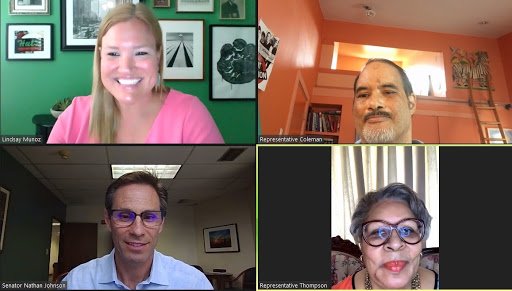Don’t cry over spilt Topo Chico.
The air conditioner stopped cooling. The dryer stopped heating. Couldn’t hang the wet clothes outside because it started raining. And oh yes, my phone stopped working. Not a great weekend.
But I didn’t dare complain. Given the persistent gloom and anxiety these days, it’s worth a mental effort to note each little moment of good fortune, however small and fleeting. So when I accidentally knocked over a bottle of Topo Chico, and the toppled Topo fell to floor and didn’t break, it seemed like a pretty good start to the day. I’ll take it.
Having been spared the glass cleanup and a $1 or so of fizzy water, I thought of course about sales tax revenue (even though bottled water is exempt from sales tax), which made me think of city budgets, which reminded me of the absurd partisan political charade transpiring right now over the proper scope of state and local authority and responsibility. Read more in the Policy Spotlight below.
Some interesting things:
DFW-area mayors meet routinely to share insights and observations, discuss challenges, and explore ideas for how best to address those things that so directly affect each of us every day. I joined them recently for an important conversation about meeting increased needs in a time of decreased revenues. Recognizing that – by design – cities carry the burden that the state does not and often cannot, I aim to work with, rather than against, local government in my district. That’s not a universal attitude among legislators.
I’m not done with my efforts to discourage and reduce illicit sales of vaping products to minors, and to that end I met with various anti-tobacco advocates and health experts, members of the Tobacco 21 Coalition. Last session, my bill on this subject had a strong majority of support in both the Senate and the House. But hostile forces (not mentioning names here) managed to kill the bill on a hyper-technical and patently meritless procedural point of order in the House. They didn’t win, though. My new version of the bill will be stronger and more comprehensive, and we will pass it.
Yes, I’m still working on Medicaid expansion in Texas. In addition to several meetings, I spoke one-on-one with WFAA’s Jason Whitely as part of the Texas Tribune’s annual TribFest. Broad in scope, we covered what Medicaid expansion could do for Texas, the changes in the political environment that affect viability of expansion (including growing support from the business community), and the social, economic, and political consequences of passing – or not – a Medicaid expansion law. The case for TXMedX keeps getting stronger. Please take a look at my TXMedX page, where you can check out recent compelling studies on how Medicaid expansion would affect our state economy, state budget, and county health systems and finance.
Policy Spotlight: The Politics of Local Control
The thing about cities is that most people live in them. And they’re pretty happy with their city governments. So why, for the last few legislative sessions, have state leaders been so hostile to local government?
The anti-city crusade reached a new high (or was it a new low?) recently, when state lawmakers publicly announced their intentions to throttle local revenue for any city that would dare reduce its law enforcement budget – even during a revenue crunch. With sad irony, this comes when the state itself is making significant cuts to support for local law enforcement. Really. They even criticized the City of Dallas for proposing to trim police overtime, even though the City actually proposed an overall increase in police funding.
Having thus dispensed with the question of sincerity, let’s consider the call to ban cities from contracting with professionals to fix traffic lights. Wait that’s not it. Lawyers? No. Engineers? No. But many state leaders have called for legislation that would ban cities and counties from contracting with professionals to perform an essential function of local government: advocating in the state Legislature. Those professionals are called “lobbyists”. Companies hire them. Non-profit advocacy groups hire them. Individual projects hire them (e.g., the bullet train). And cities large and small hire them too. Always have. Should they? Maybe, maybe not. That’s a question of local, not state, policy. It is for you and your city councilmembers to assess whether hiring a lobbyist for a particular issue serves the interests of local citizens.
What we have here is politics driving policy. That’s bad. The idea that state government would review city budgets should scare any skeptic of big government. That the state would actually take over law enforcement at the local level … whoa (who’s going to pay for that, anyway?). Banning cities from contracting with legislative advocates is akin to banning companies from hiring outside lawyers, or banning homeowners from hiring tax consultants to help with protests. The whole narrative undermines the spirit of 100+ years of successful local control.
Pitting state government against local government is just bad policy. It results in an over-stretched state government that’s ill-equipped to handle local issues consistent with local needs and character. It tempts state lawmakers to blame local officials for state failures (like rising property taxes). And it raises serious questions about racial equity, as representation in cities and counties tends to be more reflective of local demographics.
We can’t have it both ways. The state doesn’t have the resources or expertise to run local affairs. If the public wants state government to manage everything, we’re going to need a bigger state government. I don’t think that’s what Texans want. I know I don’t.



